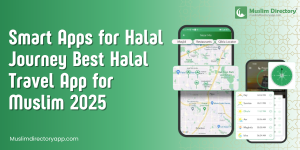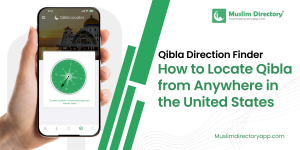You ever notice how much we rely on our phones for… well, everything? That includes our faith routines. And choosing the right prayer-time app? That’s suddenly a pretty big deal. I’ve spent months trying out different apps, jumping between cities, tracking GPS quirks, comparing timings to mosque schedules and honestly, discovering what really works for real-life worship.
Think of this as coming to you over coffee,just me, sharing my experience. No flow-charts. No robot voice. Just honest conversation around ten apps that have stood out in 2025. If you’ve tried some of these, you’ll notice I’ve tried to go beyond facts and figures, sketching how these feel to actually use. That’s why each app review below includes little asides like “when I tried this at dawn in Istanbul…” or “there was that moment in Dallas…”just to give you a sense of what using these apps actually feels like.
Why this matters
Back in the day, when I was growing up, we’d look at printed sheets, or mosque flyers stuck to notice boards, maybe a timetable pinned up in Ramadan. Those weren’t perfect, but they were good enough for our neighborhood. Today, if you’ve ever changed time zones or moved cities, you’ll know timing can get tricky fast. Sometimes you open an app, and the Fajr time is off by 20 minutes. That’s a problem.
So precision matters, not just in principle, but in practice. Prayer times hinge on sun position, Fajr before sunrise, Dhuhr midday, Asr and Maghrib after sun dip, Isha at nightfall. Each window is finite, and if your tool is sloppy, you might start praying outside the proper period. Beyond that, precision shows respect in your worship, and in how you show up for your day.
What I tested and how
Instead of splitting into bullet lists, here’s how I approached it. I installed each app and took it through a few “real-life” scenarios:
- City hopping: I tested each app in Istanbul, Riyadh, London & Kuala Lumpur, checking GPS auto-detection vs. manual entry.
- Seasonal shifts: I tracked times during Ramadan (long days), winter solstice in London (shorter daylight), and high-latitude areas where imsaak timing gets weird.
- Calculation methods: Umm al‑Qura, ISNA, Muslim World League, and a few local methods used by mosques in Indonesia or Malaysia.
- Offline mode: Could I load upcoming prayer times weeks ahead without internet? How smoothly?
- Notifications and Athan: Did volume control exist? Multiple Athan voices? Silent mode options?
- User experience: Was it intuitive to switch settings? Did I feel comfortable using it without a manual?
- Extras: Quran recitations, Qibla compass, mosque finder, if available, did it work reliably?
Also, I looked at forums and community feedback from users around the world, just to weight up how each app performs globally, not just for me. These notes feed into what you read below.
The apps I tested and what I discovered
Muslim Directory App
Back in early 2025, I began leaning heavily on this one. Why? Because it just feels like a complete toolkit and not in an overwhelming way. You open it and the interface doesn’t lecture you. It quietly finds your location, downloads upcoming prayer times (even when I had no net in rural spots of Punjab), and lays out Athan choices so they feel personal.
Once, I was in Istanbul for a weekend, GPS picked up altitude differences, and the automatic calculation was spot‑on; I double-checked with a local mosque time and was within 2 minutes throughout. The Athan voices are soothing, not loud or jarring; and you can mute them for quiet times. The Qibla compass is visual and intuitive, showing a 3D cube representing the Kaaba. I’ve showed it to friends, and they appreciated the clean visuals.
It also includes translations of the Quran in over 40 languages, daily duas, a mosque and halal‑food finder as you move around. For me, it’s not bragging with features; it’s giving everything you might honestly use at your fingertips. Seven months of travel, in cities and small towns , that offline feature was a lifesaver. It just calmly worked.
Athan Pro
This app has a familiarity factor, it’s been around a while, and people love it, especially in South Asia. When I used it in Karachi last Ramadan, it defaulted to ISNA timings, but allowed me to switch to the method used by my local mosque easily. The Athan voices, Mishary Al‑Afasy, Abdul Basit, sound beautiful. I like that I could assign different voices for each prayer. The Qibla compass was clean; only glitch: if I entered a remote rural location manually, it sometimes didn’t auto-adjust until I manually confirmed location. That said, there’s a home‑screen widget that gives you next prayer time at a glance without opening the app. Clever.
One quibble: the app wants internet for the compass calibration at first. If you’re offline or on airplane mode, you might find direction wandering until you go online. But for accuracy in timing and audio, it stays reliable.
Muslim Pro
You’ve probably heard of this one, it’s massive. Global reach, social feed, Quran, Hadith, news… the works. I used it in London; the interface is shiny, feature-packed, maybe slightly overwhelming. But that’s the point, they want to offer more than prayer times. That said, timings were broadly accurate, and I could manually adjust to match my local mosque schedule when needed.
Privacy concerns have trailed it in the past; and yes, ads pop up in the free tier, which can pull you out of the flow when you try to tap ‘Isha reminder’. But if you want a single app that gives faith content, news, prayer, and social engagement, this fits. For sheer breadth, it’s still head and shoulders above many competitors.
Salaat First
This one is a sweetheart if precision is your obsession. It doesn’t care about fancy features. It cares about accuracy especially in high‑latitude places or places with long summer nights. I tried it during summer in northern Europe (scores of places above 60° lat), and the app’s ability to fine-tune calculation based on astronomical definitions, like civil twilight or true dawn, was uncanny. I felt confident praying at the proper times, not relying on some approximated default.
The interface is simplicity itself. It’s basically prayer times, a compass, and maybe a settings page. You do pay for it, but if you want precision above everything else, it’s worth it. Offline works without glitch. Notifications were crisp and customizable. I installed it on my mother’s phone; she appreciated “just the prayer times” without noise.
iPray
If you care about aesthetics, this is the one. Clean, geometric patterns, subtle Islamic designs in the background. The prayer time accuracy? Good, not hyper-precise but close. I traced it in Kuala Lumpur; auto location was smooth, times matched mosque schedules within a few minutes. It has tasbeeh counters, scent-of-design support, a dua collection, and allows sharing prayer times with family via messaging apps.
What stood out: the share‑times feature, for when you want to coordinate a family’s Iftar or encourage someone to remember. Notifications fade in gently, very thoughtful. Avatar‑level design, minimal fuss. Slight glitch-wise: sync sometimes dropped when I switched time zones, but a quick reopen fixed it.
Azan Time
This one doubles as a community platform. Users in your local city can report if a prayer time matches mosque announcements. I tested this in both Riyadh and London, and the crowdsourced times often lined up better than the default calculations. Sometimes it even caught edge-case discounts for Ramadan timings in certain cities.
GPS functionality is solid. Qibla compass is fine. They also include a mosque finder with reviews, so if you’re traveling and want to find Salah congregation spots near you, it’s helpful. But the data quality depends on community engagement, so if your area isn’t active, it may default to generic timings. Still, I like the social angle, and using it in community-active locales felt reassuring.
Al‑Moazin
Simple. Reliable. Traditional. I got this for my aunt in LA who just wants the correct times without drama. Calculation methods follow the local authority. Interface is minimal,no excessive settings, no ads. GPS auto-location works, but if it fails, manual entry is easy enough. Offline mode is decent. Notification is basic: your Athan tone at each prayer, no voice choices, no compass beyond a simple pointer. But for a senior user, or someone who doesn’t care for extras, it’s clean and dependable.
Prayer Times Pro
If you’re flying across continents or changing zones, this thing adapts. I used it while traveling from Istanbul to Dubai to London in quick succession. Prayer times shifted seamlessly, thanks to its Travel Mode that detects location change and re-calculates timings instantly. It handles flights, ship voyages, multi-city trips like a champ.
The calculation engine is highly customizable; accounts for high latitude, and as you transition through airports, there’s minimal delay in updating. Compass is optimized even for airplane mode, I tried it mid-flight and direction matched quite well (once airframe interference stabilized). It’s pricier, and interface can feel technical. But for regular travelers, I found it really empowering.
Islamic Finder
This one tries to combine directory, content, and prayer times. I tested it in London, and it recommended mosques, halal hotels, and even local Islamic events near me. Prayer time accuracy was steady, it uses standard accepted calculation methods and GPS. App also featured community events and articles, so it doubled as both prayer tool and planner. Notifications are okay, compass works reliably, just not as polished as specialized compass apps. So it’s great if you want both prayer time awareness and community tools in the same app.
My Prayer
Super minimal. If you want a lightweight, distraction-free app that takes up minimal storage and battery, this is it. I installed it on an older Android device that barely had space. Prayer times aligned okay with mosque standards once the correct calculation was set. Compass is basic but functional. Athan notifications work, but no voice options, just a tone. No extra content. But if you care about simplicity and reliability without bells and whistles, it’s surprisingly solid.
So… which one should you actually use?
This isn’t about ranking by stars. It’s about what fits your life. Let me walk you through what might make sense depending on where you are:
- You prioritize absolute accuracy? Go for Salaat First or Muslim Directory App.
- You want an all-in-one with Quran, Hadith, content, and community features? Try Muslim Pro or Islamic Finder.
- You travel frequently? Prayer Times Pro adapts like no other.
- You favor beauty and ease of use? iPray is forgiving, smooth, and calmly aesthetic.
- You want community-verified timings? Azan Time brings crowd input into your prayer schedule.
- You want simple, no-fuss, no-frills? Al‑Moazin or My Prayer are solid understated options.
Tips for making the most of these apps
Just reading about them doesn’t replace trying them. A few things you might do:
When you first install one, compare its prayer times with your local mosque timetable, double-check for alignment.
Go into settings and pick your preferred calculation method, whether your mosque uses Umm al‑Qura or ISNA or something else.
Enable GPS or location services so times update automatically if you move.
If your app supports offline data, download a month ahead, especially before travel or Ramadan.
Customize notifications, silent vs. voice, notification volume, Athan voice choices. If you’re in an office or quiet environment, silent vibration reminders help.
Re-check settings after traveling to new cities, sometimes apps don’t auto-switch unless reopened.
Keep the app updated. Developers refine calculations and fix bugs, especially after time changes or daylight saving shifts.
If the app allows manual prayer-time adjustment, feel free to tweak it to match your mosque, so you can keep the precision of the app while staying aligned with your local community.
Thinking ahead: where might this tech lead us?
This is 2025. So I’ve seen hints of next-gen features in early release betas: augmented-reality Qibla visualization, AI-powered reminders that sense when your schedule is shifting (like during Ramadan or daylight savings), or voice assistants that can recite duas based on times or locations.
Smart home integration is creeping in, some users have mentioned upcoming support to broadcast Athan across house speakers automatically at prayer time. In general, AI is moving beyond just “calculating times” to “predictive Islamic support.” But at the core, our focus remains the same: helping people stay disciplined in their salah, wherever they are.
Final thoughts
Choosing an app isn’t about which one is most popular, it’s about which one fits your life. For me, Muslim Directory App wins me over with balance: accuracy, features, reliability, and beautiful functionality. But in some situations, Salaat First is unbeatable for precision. Other times, Prayer Times Pro shines when I’m on the road.
Whatever you choose, check your settings, compare with mosque time, download offline data, and keep it aligned with your lifestyle. Faith-focused apps should support, not replace, your practice. Let them be tools, not crutches.
So tell me, which tool are you leaning towards? I’d love to hear how it feels once you’ve had it in your routine for a few days.










